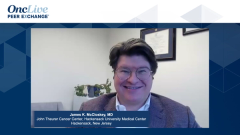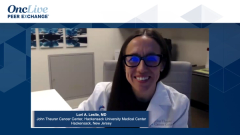
The Evolving Lymphoma Treatment Landscape
Lori A. Leslie, MD, a specialist in lymphoma, provides an overview of recent changes in the overall treatment landscape.
Episodes in this series

This is a synopsis of a Peer Exchange series featuring James K. McCloskey, MD, and Lori A. Leslie, MD, of John Theurer Cancer Center, Hackensack University Medical Center.
In this online peer exchange on recent advances in lymphoma treatment, Dr. Lori Leslie, Associate Professor of Medicine and Director of Indolent Lymphoma and CLL Research Programs at the John Theurer Cancer Center, provides an overview of the shifting treatment landscape. Over the past 5 years, there has been a major shift away from repeated chemotherapy lines toward more chemo-free or chemo-minimized approaches.
For example, chimeric antigen receptor (CAR) T-cell therapy gained FDA approval for relapsed/refractory diffuse large B-cell lymphoma (DLBCL) just 5 years ago. Now, it is standard of care in the second line for high-risk DLBCL patients unfit for transplant. Bispecific T-cell engagers like mosunetuzumab are also moving earlier, including as frontline monotherapy or combinations for follicular lymphoma. Similar trends are occurring in mantle cell lymphoma, with Bruton tyrosine kinase inhibitors like ibrutinib now incorporated frontline for patients with high-risk features like TP53 abnormalities, and antibody-drug conjugates on the horizon.
Across lymphoma subtypes, these exciting developments over the past half-decade represent marked improvements in therapy options and outcomes for patients while importantly minimizing treatment toxicity. Dr. Leslie notes how risk-stratification has enabled more personalized treatment selections, reserving intensive chemoimmunotherapy for those most likely to benefit and substituting targeted agents or immunotherapies for others poised to have inadequate responses or excessive morbidity from traditional regimens. Overall, the rapid pace of progress has sparked great optimism by enabling better tailoring of emerging therapies to the needs of each lymphoma patient.
*Video synopsis is AI-generated and reviewed by OncLive editorial staff.








































